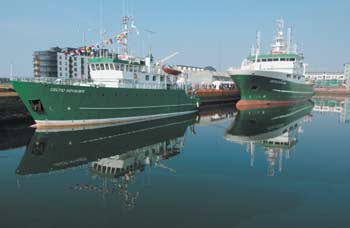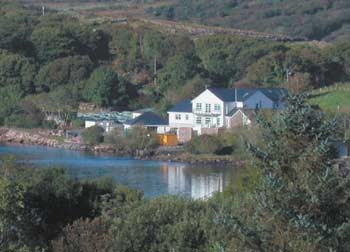| 2004 |

|
YEAR BOOK |
The Marine Institute
|
Ireland, science and the sea
|

The Galway Declaration and the EurOCEAN event represent key milestones in the development of marine science in Ireland, spearheaded by the Marine Institute. After decades of neglect in this vital area, Ireland has arrived as a significant player in international marine science, a fact recognised at the Norwegian Research and Innovation Forum � 'The Ocean and Future Aspects of the European Marine Research Area' � in Brussels on 11th June.
The EU Commissioner for Research, Philippe Busquin, said that, after the Galway Conference, it was evident that the European marine research community is already mobilised to play a role in the European Research Area, while Ms Kristen Clemet, Norway's Minister of Research and Education, suggested that 'Europe could take on a more active role in the exploration and management of the oceans'.
During the Irish Presidency of the EU, Ireland hosted not only EurOCEAN, but also four other marine science events. These included the International Conference on Molluscan Shellfish Safety (ICMSS); a dialogue event on the ecosystem approach to fisheries management held by ICES (the International Council for the Exploration of the Seas); a meeting of the heads of European research centres for fisheries and aquaculture research (EFARO); and a meeting of the European Science Foundation's Marine Board. During the Presidency, the Irish marine science community demonstrated beyond doubt how far it has developed in the last ten years.

At the Burrishoole river catchment near Newport, Co. Mayo, Ireland has a unique facility in the Marine Institute's laboratory at Furnace. This unit studies not only the fifty kilometres of streams and rivers in the 30,000-acre catchment, but also provides an inspection and advisory service to fish farms nationwide. This work complements services provided by the Institute's fish health, marine food and environmental monitoring laboratories, including an on-line harmful algal blooms service for the shellfish industry on the Institute's website at www.marine.ie.

Meanwhile, the Marine Institute maintains daily contact with stakeholders, through the work of port-based Fisheries Advisory Technicians and fish farm inspection teams, and with third level research. The Institute manages the Marine RTDI Measure of the National Development Plan 2000�2006 on behalf of the Department of Communications, Marine and Natural Resources, providing for enhanced research vessel capacity, an up-grade of national marine laboratories, and a Marine RTDI Fund to support project based research in key target areas.
The third round of research funding was launched in March 2003. Successful applicants included seven applied industry projects, two desk studies, one fellowship, twenty-two sponsorship/ networking awards, and technical assistance. The 2004 round of funding was launched in July this year, which will focus on the development of new and innovative technologies in ocean energy, water quality monitoring, acoustics, robotics and information and communications technology.
All of which build towards Ireland's rightful place as a major player in marine research and development and our recognition of the sea as a vital national resource � in line with our own Galway Declaration.
Contact: Check out the Marine Institute on www.marine.ie